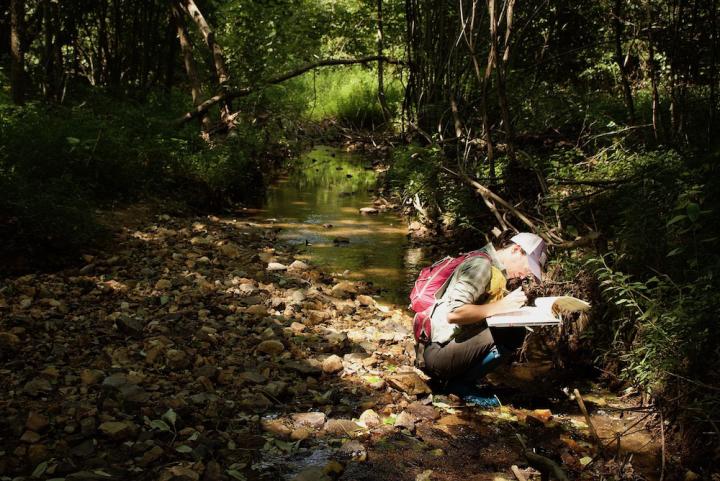
Credit: Michelle Jewell
The abundance and other characteristics of rocks partially extending above the water surface could be important for improving the recovery of aquatic insect populations in restored streams.
Nearly three quarters of stream insects reproduce on large rocks that sit above the water surface by crawling underneath to attach their eggs. Increasing the number of large and stable emergent rocks in streams could provide more egg-laying habitat and allow insects to quickly repopulate restored streams.
“We found that restored streams had fewer emergent rocks for egg-laying and fewer total eggs than naturally intact streams,” says Samantha Jordt, first author of the paper and an M.Sc. student at NC State’s Department of Applied Ecology.
The study also found that some of the large rocks in restored streams were unstable and rolled or were buried by sediment between Samantha’s visits. According to the study, these variables combined-fewer large rocks available for egg laying and that some of those rocks were unstable-may delay insect recovery.
“When a rock rolls, any eggs on that rock will likely be destroyed either by being crushed or scraped off as the rock rolls, being buried by sediment, or by drying out if the rock settles into a new position that exposes the eggs to the air,” says Jordt. “You end up with lots of insects laying eggs on the one good rock in the stream, truly putting all of their eggs in one, rolling, basket.”
Less suitable egg-laying habitat means fewer larvae or adult insects – both important for the long term health and recovery of restored streams. Aquatic insects provide several ecosystem services, including breaking down leaf litter, consuming algae, cycling nutrients, and being food for fish, salamanders, and birds.
“Many people rely on streams for drinking water, which means they rely on all of the ecological processes that happen upstream before the water reaches them,” says Jordt. “Aquatic insects maintain water quality for free. So we develop techniques so that restored streams have habitats that they can rebound and thrive in.”
Most stream restoration projects focus on the recovery of physical and chemical aspects. This study highlights how incorporating the natural history of aquatic insects will be another critical tool for both the initial design and the long-term success of restoring streams.
“Unavailable or unstable egg-laying habitat may be a primary reason why biological recovery in restored streams lags decades behind geomorphological and hydrological recovery,” says Brad Taylor, co-author of the paper and assistant professor of applied ecology at NC State. “Ensuring stable and suitable rocks for insect egg-laying could be a small design change to increase the return on our multi-million-dollar investment in stream restoration.”
###
The article, “A rolling stone gathers no eggs: the importance of stream insect egg laying natural history for stream restoration,” was published in the journal Ecology on 12 March 2021. The paper is authored by Samantha Jordt and Brad Taylor from NC State’s Department of Applied Ecology. The research was funded by the North Carolina Department of Environmental Quality and Division of Mitigation Services.
Media Contact
Michelle Jewell
[email protected]
Original Source
https:/
Related Journal Article
http://dx.




